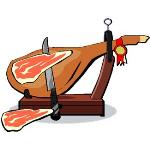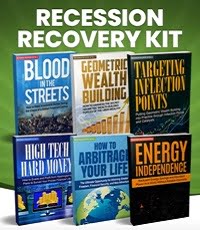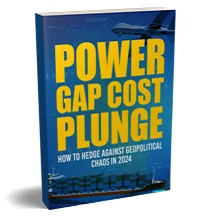
For example, we’ve noticed numerous reports lately explaining why eating piles of bacon is good for us. What’s more, just this week we came across an article telling us that putting a scoop of butter in our coffee each morning makes for a healthy breakfast. Apparently the added oil slick fills you up so you don’t need to eat much for lunch.
Huh? Perhaps these are healthy diet choices for those eager to have a myocardial infarction. We’ll stick to black coffee and a granola bar.
Of course, nowhere is the prevalence of humbug greater than the world of money. For only in the money realm do you hear things as idiotic as the popular notion that spending money – even borrowed money – makes you wealthy. Similarly, only in the world of money would you hear highly respected individuals contend that a destructive hurricane is good for the economy.
Obviously, saving and investing is the ticket to building real wealth…not borrowing and spending. Naturally, having to redirect capital from productive uses to pay for replacing hurricane damaged property is a waste. But what do we know…
Enlightened Economic Thought
Presently, there are policy makers the world over who are convinced that degrading their money will make their country’s people rich. No kidding. This is the sort of thinking that passes for enlightened economic thought these days.
For instance, the Bank of Japan confirmed on Wednesday that it would continue its money debasement scheme. By cheapening the yen they believe they can cheapen the price of their exports. In fact, the Japanese central bank is printing money at an annual rate of 80 trillion yen – or $675 trillion – to try and bring this about.
Certainly there are undesirable consequences from these actions. Namely, cheapening the currency makes imports more expensive. This is especially critical for Japan considering that they import 96 percent of their primary energy supply.
For now this may not matter too much. The price of oil dropped in half last year. Nonetheless, the combination of lower oil prices and massive money printing only managed to eke out a 1 percent increase in industrial production in December.
Yet the Japanese money printers want to keep at it. “The Bank of Japan is less likely to ease policy in the near term,” said Daiju Aoki, an economist at UBS Securities. “If it were to ease further, this would offset wage growth. There would be no positive impact in the short term.”
The Sickness that Never Ends
Here in the United States things are equally absurd. After 6-plus years of zero interest rate policy the Fed still won’t put an end to its mass distortion of financial markets. Perhaps, we’ll be stuck in a zirp world until the final crack up occurs.
If you recall, with the exception of Japan, prior to 2008 zirp had never been tried in a developed economy. Not even central banker par excellence Alan Greenspan was reckless enough to give it a go. It took Ben Bernanke, a real academic madman, to pull off such a feat.
The plan since Janet Yellen became the top seat at the Fed has been to start raising interest rates mid-year. However, this best laid plan now seems to be falling apart. The Fed’s now losing its nerve. According to minutes of the Fed’s January 27-28 meeting…
“Federal Reserve policymakers expressed growing concerns last month about low inflation and said they were inclined to keep interest rates near zero for longer to avoid derailing the recovery,” reported USA Today.
“Fed officials gave no further signal of when they plan to raise short-term rates for the first time since the 2008 financial crisis. But they indicated that they see more risk in raising rates earlier than anticipated rather than later.”
Do you see what’s going on? These monetary policies are absurd. They are also insane. Compelling millions of people to borrow and spend money after they’ve already borrowed and spent too much is the sickness that never ends.
Saving and investing are fundamental to capital formation and wealth building. Policies that reward this tried and true practice make sense. Everything else is pure claptrap.
Sincerely,
MN Gordon
for Economic Prism





